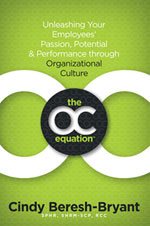Living the OC Equation Through your Organization’s Actions (Habits)
Because organizations are made up of people, they are subject to the same actions and human nature (read that as habits!) we all fall into as individuals. The question, both personally and organizationally, is are those actions (habits) helping you build the organizational culture (OC) you need to achieve your strategy? If they’re not – it’s time to reevaluate.
The Hungry Mouse
Remember years ago when you were in school and you learned about B.F. Skinner’s operant conditioning, I.e. positive reinforcement? Skinner experimented with rats in a cage and taught them to press a lever to get a food pellet. The process of cue (hungry rat), routine (pressing the lever) and reward (food pellet), created a habit in the rats to press the lever to get food. Once the habit was formed, the rats would continue pressing the lever even if they didn’t receive a food pellet, because they strongly associated the routine (the lever) with the anticipated reward.
 According to Charles Duhigg, The Power of Habit, habits consist of a cue, a routine and a reward. The cue triggers your brain to go into automatic mode and initiate the routine that will result in the anticipated reward. As time passes, if this loop is repeated enough to establish the loop, the habit becomes more and more entrenched in the person or organization’s behavior.
According to Charles Duhigg, The Power of Habit, habits consist of a cue, a routine and a reward. The cue triggers your brain to go into automatic mode and initiate the routine that will result in the anticipated reward. As time passes, if this loop is repeated enough to establish the loop, the habit becomes more and more entrenched in the person or organization’s behavior.
Habits in an Organization
The OC equation illustrates how your organization’s values, philosophies and actions work together to solidify your organization’s culture. As you begin to break down this equation, you realize that actions are equivalent to habits. Good habits reinforce a positive culture and bad habits reinforce a toxic culture.
For example, organizations that value open, honest communication often have a habit of communicating to employees and expect that communication to be a two-way dialogue. On the other hand, toxic organizations often have habits that reinforce distrust; such as keeping necessary information away from employees that would allow them to be more efficient and effective.
What habits does your organization engage in? Are those habits helping you achieve an OC that supports your business strategy?
Employees and Rats
Employees, like rats, have needs and when an organization’s OC supports those needs in a positive way, employees become more engaged and thus are willing to expend discretionary effort to help the organization achieve desired results.
The Importance of Culture
In an organization with a positive OC, employees’ habits are clearly linked with the organization’s high level strategy and goals, and leaders are rabid about providing support, encouragement and feedback to employees to consciously reinforce the OC. Habits that encourage the OC lead to higher retention, and make it easier to recruit top talent. A positive OC also reduces friction and increases trust across an organization, which means people at work are working together and in the organization’s best interests.
“Culture eats strategy for lunch” ~ Peter Drucker
Translating Habits into Culture
If your organization has made the decision to leverage OC as a competitive advantage, you must:
- Identify your values – The non-negotiable beliefs and principles of your organization. An organization’s values dictate decisions and actions that are at that the heart of the OC.
- Define how you will demonstrate those values daily – in other words what are your philosophies. Your philosophies are the embodiment of your stated values. In other words it’s how leaders expect the values to be demonstrated or “lived” by every employee every day.
- Determine appropriate Actions – what behaviors and habits will be rewarded and reinforced to ensure the desired culture is established and sustained.
Just as with Skinner’s rats, the cue, routine and reward needed to support your OC must be reinforced consistently to create the emotional connection employees need to believe it’s valid and valued.
If you are serious about leveraging your OC for a competitive advantage, habits are imperative. Understanding your current habits and how they are affecting your OC. Habits can’t be extinguished, but they can be modified. The key to success is developing and executing action plans that change the association between the cue, the routine and the reward.
– Cindy


